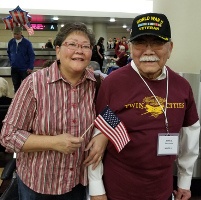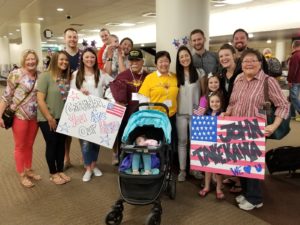
The history of Father’s Day celebrations began on June 19, 1910 when a woman by the name of Sonora Smart Dodd decided to honor her own dad, a civil war veteran, William Jackson Smart, who was a single parent to Sonora and her five siblings. More than 100 years later, people around the world mark this day as a time to reflect and honor the role of fatherhood.
Sue Nelson, RN, Lifesprk Life Care Manager, knows the tremendous value in honoring dads, especially veterans, on this day. But this one is bittersweet for her, as it is for so many adult children whose fathers are living with dementia or cognitive issues that leave their children mourning the men they were. Sue has advice for those faced with her similar situation: sparked living is still possible even when dementia is the reality. “I see it with my own clients but also with my aging parents,” said Sue. “We need to remember that dementia doesn’t define them and it’s up to us to help them relive moments and experiences that are meaningful to both you and most importantly, seniors.”
Sue’s dad, John Takekawa, a WWII veteran, recently had a memorable experience that left a lasting impression. He participated in an Honor Flight, coordinated by Sue’s sister, which flies World War II and Korean Veterans who have never been to Washington, DC to see their memorials Thanks to a last minute  cancellation just a few weeks shy of Father’s Day, they found themselves up at 3:30 a.m. bound for the Hubert Humphrey airport terminal in Minneapolis, MN, to catch the 6 a.m. flight to Washington, DC. According to the Honor Flight, these flights began after the construction of the World War II Memorial in Washington, DC to commemorate the sacrifices made by the ‘Greatest Generation.’ Yet because of their age, financial constraints, or health concerns, many of these veterans don’t have the opportunity to visit their monument. Enter Honor Flight.
cancellation just a few weeks shy of Father’s Day, they found themselves up at 3:30 a.m. bound for the Hubert Humphrey airport terminal in Minneapolis, MN, to catch the 6 a.m. flight to Washington, DC. According to the Honor Flight, these flights began after the construction of the World War II Memorial in Washington, DC to commemorate the sacrifices made by the ‘Greatest Generation.’ Yet because of their age, financial constraints, or health concerns, many of these veterans don’t have the opportunity to visit their monument. Enter Honor Flight.
John spent the day on a whirlwind of tours to the monuments and memorials in an emotional journey. This experience was important for John who after Pearl Harbor, was put into an internment camp in Idaho because his family was of Japanese heritage, even though they were also American citizens. He later joined the U.S. Army and was in the Military Intelligence Service (MIS) along with his older brother while his younger brother and mother stayed in a camp in Idaho for over 3 years. Because of this, Sue felt compelled to share what this day meant for all of them.
As the veterans returned late that evening, the sound of bagpipes filled the airport. Sue and her family watched her dad walk down the flag-lined hallways as people saluted and thanked each of them for their service. “It was an incredibly emotional experience to watch my dad honored in such a moving tribute,” said Sue. “We will remember that moment forever.”
The next day, Sue’s dad had already forgotten about his trip.
“That’s the reality of living with dementia. But when we show him photos from that day he remembers and smiles,” said Sue. “Despite having dementia, we are so glad we did this. He experienced it in that moment and that’s all that mattered. Sparked living is about the person, what is meaningful and matters most to them. Even with dementia, it’s about creating and living that spark even if we have to repeat it over and over so they feel and live that moment again.”
What will Sue be doing this weekend to honor her dad? She’ll be showing him photos of that day again so she can see the spark come alive in his eyes as his remembers that unforgettable moment. And for her, she’ll remember his spark even longer.
How will you honor your dad this weekend?



